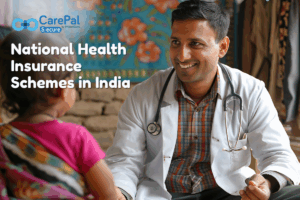The Ultimate Guide to Employer
Health Insurance

As of 2020, only 39% of working professionals in India were covered by an Employer Health Insurance plan. However, with the world realising that the Covid-19 pandemic is here to stay (at least for the foreseeable future), employers are now rethinking ways to keep their workforce engaged and satisfied. One of these ways includes shifting the focus from engagement activities (such as office parties) to healthcare initiatives (such as offering robust employer health insurance plans).
An employer health insurance refers to insurance policies that are sponsored by organisations on behalf of its employees. These insurance plans offer coverage against a wide spectrum of health concerns, and also allow employees to add their family members to the plan.
As a working professional, you undoubtedly want to work at an organisation that prides itself on having a ‘people-first’ culture. As an individual, you certainly want to ensure you’re doing everything in your power to take care of your loved ones. Opting for employer health insurance allows you to enjoy both worlds with relative ease! Understanding the nitty-gritties of employer health insurance is the first step in ensuring the same!
What are the features of Employer Health Insurance?
Employer health insurance can be characterised by a few key features. Some of these features are as follows::
- Cashless settlements for ease, and a direct settlement of bills
- Maternity cover along with cover for the infant from day 1
- Pre and post hospitalisation benefits
- Cover for surgeon fees, consultation fees, and anaesthesia fees
- Cover for diagnostic tests (these would be specified in the policy document)
- Cover for certain domiciliary expenses (this can vary from policy to policy)
- Hospitalisation cover for certain procedures such as chemotherapy, tonsillectomy and eye treatments (the degree to which these procedures are covered can vary from policy to policy)
- Cover for pre-existing conditions in exchange for higher premiums (the availability of this can depend on the policy your organisation has opted for)
- Cover for nursing charges and room rent
- An option to waive-off the waiting period (depending on which policy your organisation is providing)
What are the exclusions of employer health insurance?
As is the case with most policies, employer health insurance comes with its share of exclusions. While you must read the policy document to be identify the ones that apply to you, here’s a list of a few general exclusions that almost all policies have:
- Cover for non-allopathic treatments is not provided under a typical employer health insurance policy
- Cover for employees after they have left the organisation (in other words, your policy would only be valid during your employment period)
- Cover for the treatment of congenital diseases
- Cover for the treatment of complications due to AIDS
- Cover of ailments that have resulted due to alcohol or drug use
Additionally, while this is not always the case, you must keep in mind that there are certain employer health insurance that do not cover parental cover for employees. If this is a priority for you, you may have to ask your employer about riders or seek a separate policy that covers your parents.
What do employers stand to gain from offering health insurance to their employees?
As mentioned earlier, most employers in India are moving towards creating a people-first culture as multiple studies have shown that employee engagement and a positive work culture can impact productivity. Offering employer health insurance can be a great way to show your employees that they are more than just cogs in the wheel. As an employer, you stand to gain the following:
- A more productive workforce: Employee engagement, a behavioural-science-based approach to leadership that focuses on employee motivation and satisfaction, can boost profitability by up to 21%.
- Better talent retention: Have you ever wondered why some employees choose to stay at the same organisation their entire career? It is because they feel as though they are an integral part of the company. This sense of belonging is fostered when a company cares about its employees, and what better way of showing you care than by offering health insurance?
- Major tax benefits: You may have heard that individuals who purchase insurance policies can enjoy tax benefits under Section 80D of the Income Tax Act. Well, did you know that the same holds true for employers as well? Organisations can enjoy high tax rebates (as outlined in Section 80D of the Income Tax Act) by offering employees group health insurance.
- Low cost and easy premiums: Finally, most employer health insurance policies are offered at a low cost due to the heavy discounts companies offer to make the policy attractive to the employer. The premiums can be paid with ease through digital transactions, at intervals chosen by the employer.
What do employees stand to gain from employer health insurance?
Now you’re probably wondering whether you should opt for employer health insurance or purchase your own policy as per your needs. Frankly, the benefits of choosing employer health insurance speak for themselves. For instance:
- You can avoid health checkups: You do not need to go in for any medical check-ups prior to gaining access to the policy. Group health insurance policies are offered by companies as a part of their perks, so they would not deny the same to any individual.
- You get maternity benefits. Corporates today go out of their way to ensure female employees are offered plenty of support when they are pregnant. While the onus of long maternity leaves are, of course, on the organisation, maternity benefits related to healthcare sometimes fall on the employee. Such expenses can be hard to bear, especially if physicians suggest C-sections or other procedures to aid with delivery. Being a part of an employer health insurance plan can save you from burning a hole in your pocket due to such procedures.
- Your pre-existing conditions are covered: Consider this: Ramesh was born with Type 1 Diabetes and wants to purchase a health insurance policy. However, most policies do not cover pre-existing conditions, along with any secondary conditions that may arise due to the pre-existing condition. Ramesh, therefore, must pay his medical bills out of his own pocket. Conversely, if Ramesh’s organisation offers a group health insurance policy, he will receive coverage for his pre-existing condition, and will, by extension, be able to afford the exorbitant hospital bills.
- You can add riders: Employer health insurance policies do have a reputation for insufficient coverage (and we will be diving deeper into this later in this article). However, as is the case with individual policies, you can add riders such as Critical Illness Cover, Cancer Care, AYUSH, and so on, based on your requirements. This can help add an additional layer of financial protection during an unfortunate hour.
Understanding the difference between ESIS and GHI
Often, due to the nature of these insurance policies, people get confused between the Employee State Insurance Scheme (ESIS) and Group Health Insurance. ESIS is a government-mandated healthcare scheme that is offered to individuals who have a pay below Rs. 21,000/- per month. As an employer, if you work with permanent employees who fall below this bracket, you may have to ensure they have access to insurance through this scheme.
ESIS offers in-patient and out-patient coverage to the employee and his/her family. While there are 13.6 Crore individuals covered under this policy, this number only represents 10% of the total number of people who are eligible for the same. As an employer with 10 or more employees, you must ensure your company offers this insurance to your workers. In this case, you and your employees, both, would have to pay premiums to the Employee State Insurance Corporation (ESIC)
On the other hand, if your company has employees whose monthly salary slabs are higher than Rs 21,000, then you can offer group insurance policies from a private insurance provider of your choosing.
Comparing the top group health insurance plans
Now that you have understood the basics of employee health insurance, it’s important to identify the unique benefits top insurance plans can offer. Do not just look for the diseases covered (even though that is very important) – look at what else a policy can offer while choosing one for your employees. For instance:
| Plan | Highlight 1 | Highlight 2 | Highlight 3 | Highlight 4 |
| Aditya Birla Group Activ Health Plan | Covers the ‘ABCD ’Chronic diseases -asthma, blood pressure, cholesterol and diabetes. | 527 day care procedures are covered under this policy. | Covers 2 members and 4 children | Organ donor expenses are covered (as long as they do not exceed the value of the sum insured) |
| ICICI Lombard Group Health Insurance | AI-enabled app that offers access to wellness programs. | Tele-check-ups and health-assistance services that aid with identifying the right doctors, hospitals, booking rooms, etc. | Access to 6500 network hospitals | Coverage for pre-existing diseases, maternity care, and the infant’s medical expenses from day 1. Up to 24-hours of in-patient treatments for Covid-19 are also covered. |
| ACKO Group health insurance | In-app onboarding for new employees, lowering the administrative burden on organisations | Customisable policy – employees can choose add ons and top ups. | Modern solutions to keep employees healthy – fitness tracker, algorithm-led reminders to be healthy, doctor consultations, and medicine ordering features. | Access to over 6,500 network hospitals, 4,500 diagnostic labs and 35,000 doctors. |
| Manipal Cigna ProHealth Group Insurance Policy | AYUSH cover is offered under this policy. | Bespoke condition management services to help employees stay fit. | Multiple optional covers offered so that employees can customise their policy based on their needs. | Covers a range of family members – including dependent parents, spouse, grandparents, in-laws, uncles, aunts, nephews and nieces. |
Covering your spouse/parents under employer health insurance plans
While many policies cover the employees’ spouse and children, some also go the extra mile and offer coverage for one’s dependent parents. Of course, a lot depends on the policy that the organisation has chosen to purchase. Certain policies give you the option of choosing a Family Floater plan and this lets you add your dependent parents along with your spouse. Others, like the aforementioned Manipal Cigna ProHealth Group Insurance Policy, allow you to extend the coverage to a host of dependant family members.
To understand the benefits of covering your parents in an employer health insurance policy, let’s take a look at an example.
Sunaina has elderly dependent parents who live with her. Worried about their health, she approaches a health insurance company only to be faced with many hurdles – medical tests, the fact that pre-existing conditions are not covered, and extremely high premiums owing to the age of her parents. Disheartened, Sunaina is now worried about the inevitable healthcare expenses that she will have to pay out of her own pocket.
Riddhima, on the other hand, works with an organisation that offers group health insurance. She asks her employers about the same and opts for a Family Floater plan. Now, she does not need to worry about medical check-ups or pre-existing conditions as her parents are automatically covered under the same policy.
Is employer health insurance mandatory?
The Covid-19 pandemic highlighted the need for a comprehensive health insurance policy, with many people struggling to make ends meet after extensive hospitalisation. As of 2020, it is now mandatory for employers to offer group health insurance policies to their employees.
Is the coverage under an employer health insurance plan truly enough?
Now, here’s the 5-Crore-Question: should you rely solely on your employer health insurance policy? The answer depends on a few variables that you need to examine. Once you have the policy in-hand, go through the fine print to understand whether there are any loopholes you need to be aware of. From a general perspective, the following factors are essential when answering this question:
- The Cover: In order to foot the bills for every employee’s premiums, companies may elect to choose a low cover to reduce their costs. Examine the sum assured (as well as the sum insured) to understand what this means for you. For instance, let’s say a policy promises to cover organ donor expenses – with the caveat being that the expenses don’t exceed the sum insured. If that happens, the expenses may not be covered at all, or not be covered fully.
- Co-pay clauses: If there is a copay clause in the document, it means that you will have to pay a percentage of the expenses, while the insurance provider will pay the rest. In this case, having to incur a financial burden is still a very real possibility.
- Room rent limit: Room rent limits refer to the cap in the tariff of the hospital room. Let’s say it’s capped at Rs 1,000 per day as per the policy chosen by your organisation. This means that either you can choose to stay at a room priced at that tariff (which may end up being a ward, or a shared room as hospital tariffs are much higher than that), or you can pay an additional amount to get the room you desire. The latter means you need to work that expense into your budget.
- Changes in the policy: Your employer can make changes in the policy at his/her discretion. The policy can be cancelled if the organisation is going through a bad period, or can be stripped to bare minimum coverage. Keeping tabs on your policy is one of the most important things you can do if you’re planning to rely on it.
So, what does this mean?
The truth is that it is more beneficial to have a group insurance policy (along with your own individual policy) than not having one at all. You can leverage the group policy to cover your dependent parents and make sure that their medical bills are taken care of. At the same time, you can ask your spouse to take out a family plan, or take out an individual plan if your policy provider allows it.
3 Questions to ask your employer during your final interview!
Once you’ve made it to your final interview, now is the time for negotiations and posing queries about the company itself. You should definitely ask about employee health insurance and whether the company offers the same, when you are discussing the perks. Remember that frequent flyer miles or office parties may be fun perks to have, but health insurance is a perk that can truly save you from financial doom. With that in mind, you must ask your potential employer the following:
- What is the sum insured and sum assured of the group health insurance plan you’ve chosen?
As mentioned earlier, these factors play a large role in the kind of cover you can enjoy. Understanding this will help you plan for the future in a better manner.
- Are pre-existing conditions covered from Day 1?
There are many group health insurance policies that cover pre-existing conditions from the minute you sign the dotted line. On the other hand, there are policies with a waiting period as high as 2 years. Knowing which type of policy you have can help you take practical calls regarding whether you need to start an emergency fund (and how long you plan to work in that company).
- Is Covid-19 covered under your group health insurance policy?
There’s no escaping the fact that the pandemic is here to stay. Based on what we saw during the second wave, the expenses can be rather exorbitant. Asking for this infection to be covered under your health care policy would be a smart move.
Once you’ve received the answers to the same, you’ll be able to ascertain whether this is truly an organisation that you want to work with. With global companies now moving towards a more people-first approach, there’s no excuse for any other company to not offer benefits that can positively impact the lives of their employees.
Final Thoughts
Whether you are a founder reading this to understand employer health insurance, or an employee trying to understand whether such policies benefit you, there’s no skirting around the fact that having access to such policies can be a boon. Read your policy document very carefully and make sure you can offer your family the safety net that they deserve.
Frequently Asked Questions
- What factors decide the premium of an employer health insurance policy?
The insurance provider decides the premium based on different factors such as the number of employees insured, number of dependents, location, and age.
- Can I insure my new-born baby under the plan?
If your baby was born while the policy was active, then you can enjoy insurance benefits from Day 1. However, if you have recently had a baby and then joined an organisation that offers employee health insurance, you might have to check the eligibility age for the policy. Many policies have a minimum age of 90 days. If your infant is older than that, can you can add him/her to the plan.
- Are general health check-ups covered?
Some group health insurance policies offer a free check-up every few years so that employers can keep an eye on their health. On the other hand, others offer health tracking features in the form of an app so that employees can stay fit and healthy.
Frequently Asked Questions
Good digestion ensures proper nutrient absorption, strengthens immunity, and boosts energy levels. It also prevents complications like weight gain, hormonal imbalances, and chronic diseases.
Consider the insurer’s financial stability, claims process, coverage terms, and inclusion of services like teleconsultation and diagnostic tests. These factors ensure smooth access to care and timely claim settlements.
Poor digestion can cause nutrient deficiencies, weakening the immune system and leading to fatigue. It’s also linked to weight gain, diabetes, and mental health issues.
Adopt a balanced diet rich in fiber and fermented foods, quit smoking, avoid alcohol, exercise regularly, and manage stress to support healthy digestion.
It offers comprehensive benefits, including hospitalization, diagnostic tests, and teleconsultation, with a reduced waiting period for pre-existing conditions and cashless treatments.
Hi, my name is Om, and I am a developer at Carepal Secure. With a strong passion for technology and innovation, I enjoy creating effective solutions and learning new skills to enhance my expertise. My journey in development has been both challenging and rewarding, allowing me to grow professionally while contributing meaningfully to the projects I work on.












